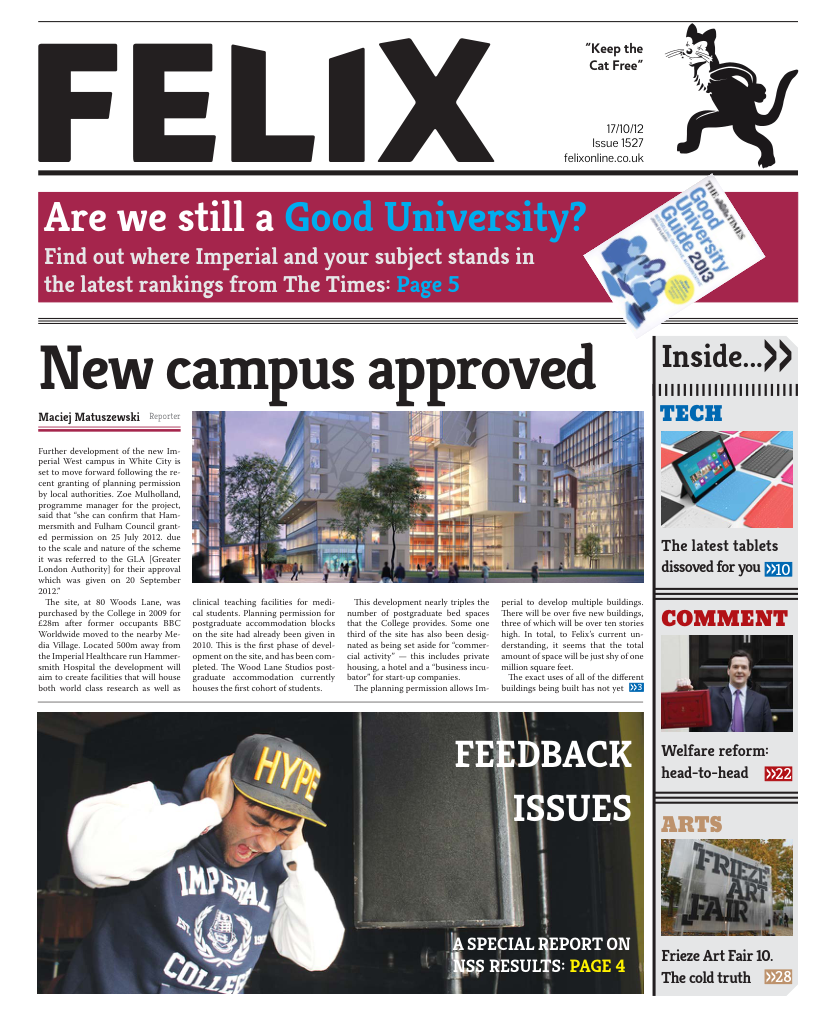Silicon Valley, South Ken
Serge Vasylechko explores the startup ecosystem at Imperial

Two weeks ago Imperial saw the launch ICStartup - an initiative that aims to inspire a new generation of student entrepreneurs. It will act as a central hub for entrepreneurial news and events around college, connecting an otherwise disparate and rich ecosystem of societies and organizations that cater to Imperial’s entrepreneurial talent. At the core of the new framework lies an accelerator programme, ICStartup+, which will give students a chance to turn their ideas into successful startups by providing support from experienced entrepreneurs, financial backing and access to a newly refurbished office space, secretly hidden in the upper floors of Beit.
Contrary to the common perception, Imperial has an extensive network of organizations that spawn the field of enterpreneurship, which could easily rival those of any UK or European university. Perhaps the most prominent one is Imperial Innovations - a technology transfer and investment company that commercialises academic research at Imperial. To date, it has generated an impressive portfolio of around 70 high-tech startups that cover almost every science, engineering and healthcare discipline taught at Imperial. Last year, Imperial Innovations created an accelerator programme, called IDEA, that provided students with free mentorship and financial support for web and mobile businesses. In just 9 months, the programme has worked with over 15 student startups, many of which begun from an idea on a single sheet of paper and have consequently grown into early stage ventures. The initiative now forms part of Startup+ accelerator that has expanded to focus beyond just web and mobile applications, but also other sectors. Any student with an idea or who would like to meet other likeminded people can simply drop in to the workshops and start building a business around their College work.
Yet if you have a strong affinity to startups that bring a real change - social entrepreneurship may be something worth exploring. The concept has gained a lot of recent popularity and is praised by governments, private corporations as well as social activists as a new type of business altogether. Whilst still being for-profit, these businesses place the importance of social rather than monetary profits at the very core of their business model. In essence, their success is measured by social change. A notable sector for social entrepreneurship is micro-finance, where special banks are setup to give out loans to the poor at very low or no interest rates. Other examples include businesses that aspire to transform education, healthcare or environment. Imperial Hub, a branch of Student Hubs, is an organization that encourages student social entrepreneurship here on campus. So if you have a new social business idea, you could apply to the programme and be offered up to £15,000 in funding with a tailored mentorship programme alongside it to help your business grow.
For those students who want to try a route with more rigorous support, IED programme offers a great opportunity to work in a multi-disciplinary and experienced team. Developed by the Business School’s Entrepreneurship Hub, a year-long programme brings together Imperial’s engineers, business school MBAs and Royal College of Art designers to form startups that are coached throughout the year in the lead up to a £10,000 investment competition.
Still, the variety of Imperial’s startup ecosystem doesn’t end here. There are many student run societies which connect their members with notable entrepreneurs and each other through networking sessions, presentations and competitions. Imperial Entrepreneurs is the largest such society which offers a range of challenging weekend competitions, such as the Apprentice Challenge, IC Hackathon and Startup Weekend. The latter two in particular let their participants run wild with ideas to generate and test business concepts in less than 48 hours. In November, there is also an annual entrepreneurship conference and a trip to Silicon Valley in April. On top of that, there is a weekly “Startup Mondays” feature informal talks by London’s hottest startups followed by relaxed socials at Eastside Bar.
Furthermore, if that seems not enough, you will find that Imperial College Business School has a range of its own interesting clubs, such as Entrepreneurs Interactive, which host a series of thematically driven speaker presentations, and Private Equity and Venture Capital Club that focuses on the advanced topic of raising money from VCs. In fact, if you are interested in the latter, you’ll find that Andreas Angelopoulos’ guest lectures series are simply invaluable for an in depth understanding of this industry. At the same time, a number of newer clubs have sprung up at Imperial that concentrate on sector specific issues. For example, OBR network, previously known as Oxford Biotechnology Roundtable, has been tremendously successful with generation of multiple leads for students interested in innovation within biotechnology sector. As a result of this we now have Marblar - a startup that was jointly co-founded by students from Oxford and Imperial. Also part of the ICStartup+ accelerator, it has recently been featured in all major tech publications around the world such as Wired magazine, Scientific American, MIT Tech Review and New Scientist.
The latest newcomer join the ICStartup community is Mobile Technology Club. Born somewhere in EEE department last year, its focus is on workshops and real world projects for keen mobile app developers. Of course, we are yet to see what this will yield. Yet, with support from ICStartup as the connecting puzzle, I think the club is likely to bring a few success stories to our mini version of the valley here quite soon.







